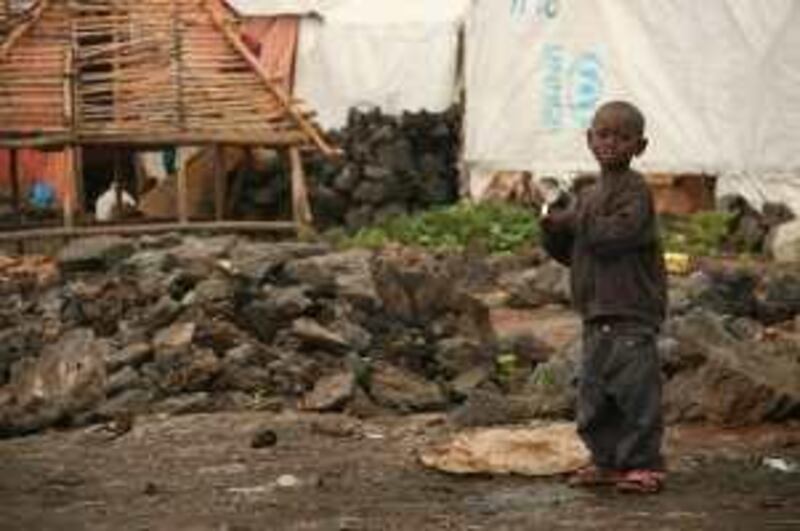KIBATI, DRC // The cramped shack of plastic sheets and scrap wood belonging to Sindi Luza bears little comparison to the village home in Rumangabo he was forced to flee during one of Congo's frequent violent flare-ups. "There was shooting everywhere. There was no way to stay with so much shooting," said Mr Luza, recounting the clash between Congolese government and rebel forces that saw his simple family life come crashing to an end. Abandoning crops of maize and beans, the farmer led his wife and seven children 40 kilometres south for three days without food to Kibati camp, a makeshift home for people ensnared by violence in the Democratic Republic of Congo (DRC).
"Life here in the camp is bad because we have nothing," said Mr Luza, 37, whose father was killed in the fighting 18 months ago. "We do not have enough food. There are no clothes, no soap, poor healthcare - it is not even possible to sleep properly. "I am ready to go back, but my house was burnt down," he added through a Swahili translator. "I just need to get some plastic sheeting and other materials, and enough food to feed my family before we can leave." Mr Luza's forced displacement - the result of fighting between national forces and a rebel Tutsi militia called the National Congress for the Defence of the People (CNDP) - mirrors the plight of many camp dwellers.
Ringed by verdant hills and shrouded under the muggy cloak of thick rainclouds, the UN-run compound houses 20,000 internally displaced persons amid mud, squalor and open sewers. Without schools, children amuse themselves with plastic bottles and refuse, while mothers wait in lengthy food queues and fathers scour nearby farmland for morsels to supplement meagre handouts. "You can imagine what life is like here," said David Nthengwe, from the UN High Commission for Refugees.
"You wake up, sit by your hut until the food is distributed. You wait for food, then return to your hut and wait some more - waiting until the day you can go home again." Some families travelled hundreds of kilometres to reach the safety of the camp, where police and soldiers from the UN peacekeeping force, known by its French acronym, Monuc, stands guard against food riots and rebel attacks. Most of the displaced people fled their homes amid fears of fighting, looting, rape and other forms of violence at the hands of soldiers - whether the Congolese national army, the CNDP or any other of North Kivu's 21 rebel militias. Monuc - with 17,000 personnel, the UN's largest peacekeeping force - is widely criticised for failing to protect civilians, although peacekeeping leaders say they do not have enough troops to safeguard the territory, the size of western Europe. "Speaking to the refugees, you get to understand how frustrated they are," Mr Nthengwe said. "Many have lost relatives and tell you how women and children have been abducted or sexually assaulted. "They want to return home, live a normal life and watch their children go to school. But hopes that the security situation is getting better are constantly shattered when we hear of a new outbreak of fighting."
The displaced people sang traditional songs to welcome Ban Ki-moon, the UN secretary general, on Sunday as he made a six-nation tour of Africa to bolster peace efforts in DRC and elsewhere. After meeting residents, the UN leader pledged to protect civilians and help families return home, noting that reduced levels of violence had seen the camp population drop sharply from its peak occupancy of 80,000. A bloody CNDP offensive came to an end last month with the arrest of the rebel group's leader, Gen Laurent Nkunda, after which his former troops began rallying to the Congolese army. Meanwhile, joint operations between Congolese and Rwandan forces succeeded in driving back the Democratic Forces for the Liberation of Rwanda (FDLR), a 6,500-strong Hutu militia alleged to have committed atrocities in the 1994 Rwanda genocide. "I think we are seeing some signs of hope, an improvement in the security situation and better prospects, with joint operations against the FDLR giving us a more space to conduct humanitarian activities," Mr Ban told reporters at the camp. But even peacekeeping officials have expressed concern that, following the exit of Rwandan troops from DRC last week, it is only a matter of time before FDLR soldiers re-emerge and launch a fresh wave of attacks against civilians. One camp resident, Martine Feza, remains fearful of returning home and has accepted a life under plastic sheeting among thousands of displaced families, sharing paltry meals with her husband and six children. The family was forced from its home in Kibumba, 25km north of Kibati, about four months ago when government troops ordered villagers to flee the area while they traded shells and bullets with an unidentified foe. Despite Mr Ban's promise of peace and security on the horizon, the stakes are simply too high for Mrs Feza to risk leaving the safety of the camp and returning to her looted property. "I am ready to go back, even today, but we are still very concerned about more fighting," she said. "Yes, it is safe for the moment, but we don't know what will happen tomorrow." jreinl@thenational.ae






